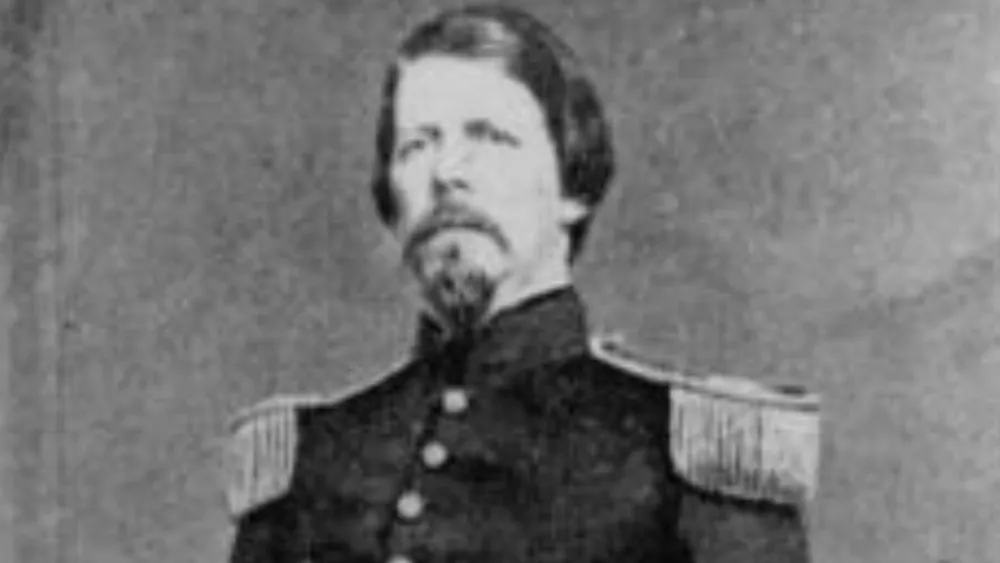Barnard Elliott Bee Jr. is a name etched in Civil War history. He is known for a single utterance that forever linked him to General Thomas J. Jackson.
Born on February 8, 1824, in Charleston, South Carolina, Bee’s life journey traversed military academies, brave service in the Mexican-American War, and a pivotal role in the early days of the Confederacy.
However, during the tumultuous First Battle of Manassas, he bestowed upon Jackson a moniker that would become legendary.
Early Life and Military Education
Bee embarked on a promising and adventurous early life. Born on February 8, 1824, in Charleston, South Carolina, he hailed from a family of prominence and privilege.
His journey to military distinction began when his parents relocated to the Republic of Texas in 1839. Young Bee, however, remained behind to pursue his education with extended family.
In 1841, he was granted admission to the U.S. Military Academy through an “at-large” appointment, foreshadowing the path his future would take.
Bee overcame academic challenges and earned demerits. However, his determination paid off when he graduated in 1845, ranking thirty-third in his class. This early chapter in his life would lay the foundation for a remarkable military career.
Service in the Mexican-American War
Bee’s journey through life and the military took a significant turn during the Mexican-American War. He found himself on the front lines of history, serving with courage and distinction.
Moreover, Barnard was with General Zachary Taylor’s army at pivotal battles such as Palo Alto and Resaca de la Palma. It is where his dedication to duty became evident.
Later, he was dispatched to recruiting service, contributing to the war effort. In 1847, he joined General Winfield Scott’s army during the siege of Vera Cruz. Barnard displayed remarkable courage at the Battle of Cerro Gordo, where he sustained a wound.
As a testament to his bravery, Bee received brevet promotions to first lieutenant for his actions at Cerro Gordo and then to captain for his role in the storming of Chapultepec.
His gallant service during the Mexican-American War earned him military accolades and a sword of honor from the state of South Carolina, recognizing his dedication to duty and his country.
These experiences in the crucible of war would shape Bee’s future in the military and his lasting legacy.
Post-War Military Career of Barnard Elliott Bee Jr.
Following his service in the Mexican-American War, Bee embarked on a dynamic and adventurous post-war military career. This engaged him in various roles across the American West.
During this period, he gathered valuable experience, learning to navigate and manage life’s challenges on the frontier while stationed at various Western military posts.
One particularly notable assignment took him to Fort Laramie in Dakota. In this territory, he encountered the intricate dynamics of the American West during a pivotal phase in its history.
It was a time when the nation was rapidly expanding westward, and the military played a significant role in maintaining order on the frontier.
Leaving the U.S. Army for the Confederacy
Bee’s unwavering dedication to the U.S. Army took a momentous turn with the eruption of the secession crisis. Bee found himself at a crossroads as South Carolina made the historic decision to secede from the Union.
On March 3, 1861, facing a critical choice, he resigned from the U.S. Army. This courageous move signaled his allegiance to the Confederate cause. Moreover, it demonstrated his commitment to the Southern states’ struggle for independence.
This pivotal decision began a new and transformative chapter in Bee’s military journey. It ultimately propelled him into a prominent role within the Confederate ranks, where he would become a key figure during the early stages of the American Civil War, leaving an indelible mark on the nation’s history.
Barnard Elliott Jr. and His Role in the Crucial Battle of First Manassas
The First Battle of Manassas, or Bull Run, is a defining moment in Bee’s military career. Amid the American Civil War’s early turmoil, Bee played a pivotal role on July 21, 1861.
His brigade, part of General Pierre G. T. Beauregard’s Army of Virginia, faced the brunt of the federal assault on the Confederate left wing.
Positioned strategically at the Battle of Manassas, Bee’s leadership was instrumental in delaying the Union advance, buying precious time for the Confederate forces.
However, during this chaotic and intense battle, Bee uttered the famous words that would etch his name in history.
The Birth of ‘Stonewall’ Jackson
Seeing General Thomas J. Jackson’s brigade standing firm during the chaos, Bee rallied his men with the iconic cry, “There stands Jackson like a stone wall!”
Though its intent remains debated, this utterance bestowed upon Jackson his enduring nickname, “Stonewall,” and became a legendary moment of inspiration on the battlefield.
Tragically, Bee fell mortally wounded during the battle, succumbing to his injuries on July 22, 1861, just as the enemy assault began to recede.
The First Battle of Manassas marked a critical chapter in Bee’s life, leaving an indelible mark on the history of the Confederacy and the American Civil War.

Paying Tribute to Barnard Elliott Bee Jr
The legacy of Barnard Elliott Bee, Jr. is one woven into the fabric of American history, particularly the annals of the Confederacy and the early stages of the American Civil War.
His life was cut tragically short on the First Battle of Manassas battlefield. However, his impact resonates through the ages. Bee’s historic utterance on that fateful day.
“There stands Jackson like a stone wall,” not only immortalized General Thomas J. Jackson but also became symbolic of the unyielding resolve and bravery displayed by Confederate soldiers during the war.
Bee’s legacy extends beyond his famous words, as his unwavering dedication to the Southern cause and his decision to transition to Confederate service exemplify the complex choices faced by many Americans during this tumultuous period.
Reflecting on The life of Barnard Elliott Bee Jr.
Today, Barnard Elliott Bee, Jr. is remembered as a symbol of the enduring spirit of those who fought for their beliefs during the American Civil War.
His name lives on in the annals of history, serving as a reminder of the sacrifices made by countless individuals during this pivotal moment in the nation’s history.
Bee’s contributions, both in his military service and iconic words, continue to be studied and commemorated, ensuring that his legacy is an integral part of the American story.




